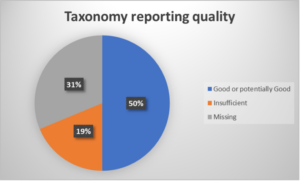EU Green Taxonomy: good idea, bad implementation
Dr. Jane Thostrup Jagd, Deputy Director, Net Zero Finance
The EU’s “Green Taxonomy”, which has started to roll out this year, aims to define which of a company’s activities are “green” thereby making it easier for true corporate climate leaders to attract investment. The idea is a good one.
However, the legislation is imprecise and the implementation has been poor and rushed. Based on an analysis of 32 reports from companies that we work with, We Mean Business Coalition strongly advises the EU to establish a Preparers Forum for sustainability reporting regulations, to avoid unfortunate legislation and lack of guidance in the future.
The Green Taxonomy is a classification system designed to identify which business activities can be considered ‘green’, and therefore consistent with the European Union’s Green Deal and efforts to make the EU climate neutral by 2050.
Since January 1st 2022, companies have been required to disclose whether their economic activities for the reporting year 2021 are classified by the taxonomy or not. If you think the phrase economic activities is vague, you are not alone. The legislation does not define what constitutes an economic activity that needs to be reported on. All financial and non-financial companies with a total balance of over €20 million or a turnover that exceeds €40 million and with more than 500 employees must report in this way. All non-financial companies must also report on green turnover, green operational expenditure (OpEx) and green capital expenditure (CapEx).
For the reporting year 2021, non-financial companies only need to report on whether substantial parts of their economic activities are “eligible” or not. They do not need to reveal whether their activities meet the standards to be considered green and thereby are considered to be “aligned” yet. Eligibility of economic activities simply indicates that an economic activity is included in the Green Taxonomy. Alignment-reporting will come into force from the reporting year 2022.
So, this year should be simple for reporting…right? Unfortunately, not.
When a good idea meets real life
To understand how the Green Taxonomy is working in practice, We Mean Business analyzed the annual reports from 32 companies that we consider to be amongst the most effective corporate climate action leaders. Based on that research our view was that 50% were “Good or potentially Good” in relation to their alignment with the taxonomy, 19% were insufficient, 31% simply did not report on the taxonomy.

We combined “Good” and “potentially Good” into one group to give the companies maximum benefit of doubt but also because it can be very difficult to assess whether a report is made “according to the legislation” because so many elements are not defined properly in the legislation. For example, as mentioned a definition of “economic activity” is missing in the legislation. This raises questions like: does an “economic activity” have to generate turnover? Is it defined in accordance with the ordinary financial segment-reporting, or can it also be capital expenditure of a new green office building? Can it be R&D cost for new experimental energy solutions?
Another problem is whether the contribution of an economic activity is “substantial”? For instance, breweries are currently not covered by the taxonomy – but is transport of the beers to the shops covered, since transport is covered by the taxonomy? Is that a substantial economic activity, which should be separated from the brewing? In our analysis we can also see economic activities included, which only have a marginal impact – 0.01% – on green turnover. Is that considered substantial? None of this is clear which means companies and their auditors will make their own interpretations.
We have examples of auditors, who indicate they cannot sign the taxonomy reporting, because the legislation is too vague. One said: “The EU Taxonomy Regulation and the Delegated Acts issued thereunder contain wording and terms that are still subject to considerable interpretation uncertainties and for which clarifications have not yet been published in every case…. Due to the imminent risk that indeterminate legal terms may be interpreted differently, the legal conformity of the interpretation is subject to uncertainties.”
Another problem is the timing of the legislation and the subsequent implementation time. The latest delegated regulation was adopted by the European Parliament and the Council 6th July 2021 – and the latest Frequently Asked Questions (FAQ) was only submitted by the EU in February 2022 for the reporting year 2021. At that point most companies had already finalised their reports or at least drafted it. This made it practically impossible for companies to report in accordance with regulations and guidelines.
As a result of this timing issue, some companies even admit in their reports that they know their reporting is insufficient. One said: “We cannot provide total operational expenditure as defined by the EU taxonomy as this information cannot be made available at the required aggregation level at this stage”. From another: “Work is going on to adapt databases to be able to extract capital expenditures and operational expenditures corresponding to selected projects, and to allocate the share of the capital expenditures of each project corresponding to enabling activities eligibility criteria”.
This is unsatisfactory – for companies, for auditors and for the investors who are to use the reporting. More importantly, it is deeply unsatisfactory for the climate, as the reporting still fails to support investors to identify green activities which means they cannot direct their capital effectively.
Time for a ‘Preparers Forum’ to fine tune the legislation and implementation
Today, when financial regulation is adopted in the EU, it is based on the International Financial Reporting Standards (IFRS). IFRS is the standard setter. Within the IFRS there is a ‘Preparers Forum’. This is a vital space that helps make sure new legislation is understandable and useful for companies. There is currently no ‘Preparers Forum’ for sustainability reporting within EU, and IFRS is only at the beginning of establishing sustainability standards, which will evolve over the next couple of years. While the European Financial Reporting Advisory Group (EFRAG) has some sustainability expert groups, they only provide guidance to the European Commission rather than being the standard setter.
We recommend that the EU establishes a Preparers Forum on the sustainability reporting standards. This group could help ensure that future sustainability reporting legislation and guidance is understandable and immediately useful for companies. It is a proven tool which has the potential to make a huge impact. If the implementation can be made as effective as the concept, then investment can flow into businesses that are leading the way on climate action in Europe, at the speed and scale necessary for halving global emissions by 2030.

